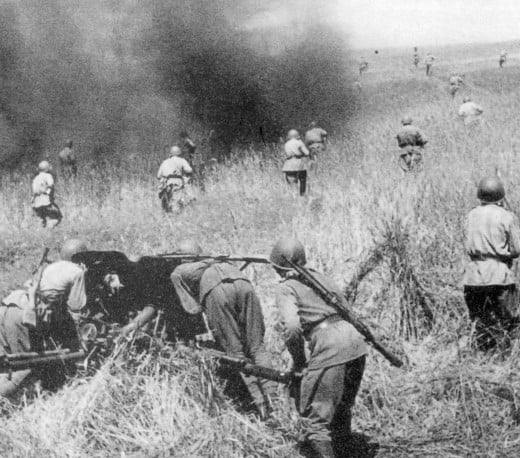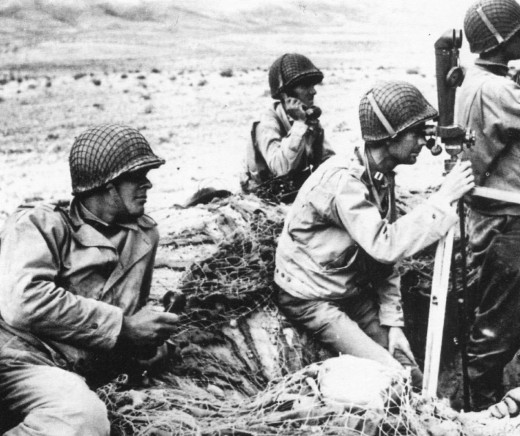"Jacob the Liar" -- Inside a Nazi Ghetto -- A Film

Scarcity of News -- Fascist Method of Control
The film begins with Jacob Heym chasing a newspaper; his fellow inhabitants in the ghetto are starved for news from the outside world. They are completely isolated from society for all radios were long ago confiscated and they are surrounded by concrete walls, barbed wire, and guards with spot lights and machine guns.
Heym's wild chase after the newspaper brings him the unwanted attention of one of the German guards who sends him to the Kommandatura (Military Headquarters just outside of the ghetto) to receive punishment for being out on the street after curfew, even though it is not yet 8:00pm and Jacob has not broken curfew. While waiting to talk to the officer in charge, Jacob hears “good news” over a radio in the commanding officer's office inside Nazi Headquarters.
Surprisingly, perhaps too busy with a girlfriend, the officer does not punish Jacob and instructs him to return to the ghetto. The ghetto gates have been locked because it is now after curfew. Jacob finds a way to get back into the ghetto, because Jews found outside are always shot.
Once safely back inside the ghetto, Jacob’s great dilemma is what to do with his forbidden information gleaned from a radio broadcast. Should he keep it to himself, which is safer, or should he share it with others to give them a bit of hope and a reason to hold on a little longer in the ghetto? Jacob changes his mind repeatedly about what the correct course of action should be.
The film examines the role of "hope in desperate situations" and it poses, again and again, the following question to the audience, to us, “Is telling a lie, or a series of lies, the morally correct and proper thing to do, if it brings hope and thereby, possibly saves lives?” The film is an amazing study of the often conflicting expectations and demands of survival and traditional morality.

Jewish Character, Emotion, Religion, Survival
The film also presents us with a variety of Jewish characters all struggling to maintain some sort of sanity in the vicious and insane world created by the Nazis. Families try to maintain some kind of decent and normal home life amid the most abnormal circumstances. We are treated to a rather amazing level of dark comedy and ironic humor, unusual in a Holocaust or "war" film, but which enhances the pathos and drama of the Jewish plight.
The use of humor also personalizes and humanizes the ghetto inhabitants, rather than minimizing the reality of ghetto life as one might expect. There are plenty of sobering and violent scenes which reinforce the horrors experienced by people unfortunate enough to be caught up in the Nazi system.
Through the emotional and religious responses of several characters to Jacob’s news, we are shown the competing religious perspectives of Jews and the wonderful complexity of human strength, weakness, and character. Acts of kindness, tenderness, acceptance, and courage emerge where one does not necessarily expect them to exist at all.
The film ends tragically as it must, if it is to be true to history, with the torture and murder of Jacob Heym. At the same time, the film also ends with a statement about the enduring value and necessity of hope and the life enhancing power of belief. Although the film is based on a novel, the novel was written by a survivor and is based on real-world conditions that existed in many ghettos. While thousands and thousands died, some Jewish, and non-Jewish, victims of the Nazis, did survive long enough to experience liberation by one of the Allied armies. This is an excellent film and well worth watching.
Note: I show this film to my college level Junior - Senior History courses. Students are given the Study Guide below to guide them in composing an analytical essay.


History Film Essay Guide
JACOB the LIAR -- Essay Study Guide
You have now seen three films about ways in which people tried to RESIST the Nazi regime -- Swing Kids, Valkyrie, and Defiance. In this film with Robin Williams I want you watch for ways in which the characters resist the Nazis, but also for the ways in which they try to survive their ordeal inside the ghetto. Below is a list of the major characters. I am only going to give you two major essay topics to discuss, but you should provide four or five examples (paragraphs) for each topic. Your final essay, double-spaced, should be 4-5 pages long.
Jacob Heym (Robin Williams) - Jewish café owner, wife killed by Nazis
Mischa (Live Schreiber) – ex-boxer, friend of Jacob
Rosa Frankfurter – Mischa’s girlfriend, then fiancée’
Professor Kirschbaum (Armin Muehler-Stahl) – doctor inside the ghetto
Kowalski – the ghetto barber, longtime friend of Jacob
Lena Kirstaad – little girl whose family is deported, hidden by Jacob
Mr. Frankfurter (Alan Arkin) - stage actor, Rosa’s father
Samuel – older man who is often Jacob’s work partner
1) How did the people imprisoned in the Nazi ghetto try to survive? What were there survival strategies or techniques? What talents, abilities, ot characteristics helped people in their attempt to survive? Why do you think some people died quickly while others survived the ghetto hardships for a very long time?
2) How did the ghetto inmates resist the Nazis (or resist their plans and purposes)? Did different people have different ways of resisting the Nazis? Were most people too afraid to openly resist them? Why? Remember that resistance in this film may be very different from resistance in the other three films.

- Holocaust Denial: An Important Conversation about W...
Academic historians and the general reading public have been quite surprised to see a resurgence of Neo-Nazi groups, Hitler sympathizers, and Holocaust Deniers in the West in the past twenty years. There are at least two types of Holocaust Deniers, a - Secondary Sources on American Veterans, the Holocaus...
Primary Historical resources are extremely useful, but they can be difficult to access. So most of us need to rely on Secondary Sources. The following is a detailed list of scholarly books which is relevant to American Soldiers during World War II, t - Civilians Murdered During the Holocaust - Europe Dur...
We are all familiar with the number Six Million, representing the best estimate of the number of Jews murdered by the Nazis during the Holocaust. We are less familiar, some of us unaware of the total number of people exterminated by the Nazis, 22,000 - Important Questions About World War II, Oppression, ...
Pondering what the German people knew at the time about the Nazi goals and activities can lead to a number of questions which are relevant for us today. - Another Look at the Interaction of American GI's and...
Most World War II GI's were horrified and morally outraged by their experience in the concentration camps, however, moral outrage did not always lead to retaliation and abuse of German soldiers. Some GIs stressed the importance of the Geneva Conventi








